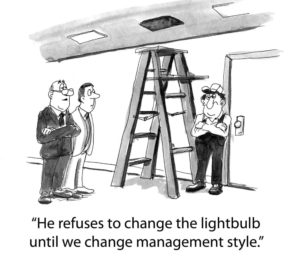We are living in the most turbulent and uncertain times any of us has known.
Perceptions of how the world has worked have been turned on their head.
Issues that once seemed peripheral are now mainstream: climate change, the meaning of democracy, the rights and expectations of the individual. And on top of all that along came the ultimate gamechanger: Covid19.
In business as well as in private life, the world is now pre- and post-pandemic.
We are realizing that there is no ‘going back to normal’. We must find a ‘new normal’ and business must take this on-board.
Leadership now and in the future
This article is about Leadership in the new world order.
Will what we had in the past work in the future? What adaptations will business leaders have to make to remain competitive?
A recent news article highlighted the case of a business owner who, faced with working entirely with remote staff, installed a programme on their computers to measure every keystroke, time away from the keyboard, and turning the metrics into statistics on which to measure productivity.
Needless to say, this story provoked a high level of interest and a wide range of opinion on the ultimate prospect of long-term success!
Working from home
Having had to send staff to work from home to keep the business running, many business leaders have been amazed and pleased to find not only have they kept afloat, they have prospered.

Working from home is looking like it may be the ‘new normal’. In fact, we have put together a Remote Working Hub for that very reason.
We include templates and documents to cover all aspects, from policies and risk assessment to mental health.
If your workforce is remote working, check it out!
A recently released survey by the Institute of Directors found that 74% of businesses now plan to maintain the increase in home working.
Get the full figures from the IOD study on home-working here
However, only 44% of leaders felt working entirely from home was effective and were not in favour of or likely to switch to full time working at home.
But the survey also found most people who work from home are as productive, if not more so than those working full time in an office.
What about the remaining 56%? Most were in favour of flexible working practices, but cited objections to full time home working, for reasons of practicality. However 33% of these have already moved some of their business online.
So, it looks like an element of home working is going to be the ‘new normal’ where the nature of the business will support it.
What Does This Mean for Leadership?
It’s fair to say that the majority of Leaders and Managers in the UK are used to having their staff in front of them or close by, in an office, where they can ‘keep an eye out’, ‘hold quick discussions whenever needed’, etc.
In a previous article looking at leadership, we talked about three leadership styles:
- The Authoritarian – militant style; rarely involves others in decision making; neither expects nor welcomes feedback (politician – Thatcher; Trump)
- The Democratic – accepts others may have greater knowledge; involves people before taking decisions (Jobs; Shankly)
- The Laissez-faire – gives freedom to be creative; freely rewards success; drives innovation but rarely gives an opinion (Zuckerberg, Branson)
The Authoritarian
The authoritarian leader is, frankly, going to struggle with not being able to see everyone all the time. His/her inability to allow others to make decisions will become impossible to manage in a virtual world, will slow down the speed at which businesses are going to have to move post-virus and could end up threatening their own survival.
Could this individual change and adapt? Unlikely. Because it’s about trust and authoritarian leaders tend not to trust anyone except their own close circle and place less value on the knowledge and skills of those working for them than they do on their own abilities.
The Laissez-faire
For the Laissez-faire leader, there is going to be a challenge in not being able to see the ‘big picture’ at any moment in time without increasing their mode of communication to be sure everyone is pulling together.
Could this individual change and adapt? Likely. Because they value and trust people; they just don’t want to be at the kernel of every decision all of the time. Again, it will come down to communication to decide how much freedom of expression can be given, where and when.
So, this pivots inevitably to the Democratic Leader being in the best position to succeed in a post-Covid virtual world, because of the key characteristics of democratic leadership.
What are the Key Characteristics of Democratic Leadership?
- Communication is key. The democratic leader can facilitate conversations and discussions – face-to-face or via the new remote technology.
- Trust. The democratic leader trust his/her key team members and is willing to use their expertise. He/she isn’t phased by realizing that they don’t always know best and that others have skills they are lacking that can be used to the business’ advantage
- Respectful with an open mind. The democratic leader is not likely to fly into a rage when being challenged, especially if it’s something with which they do not agree. Instead they will accept the disagreement and facilitate discussion to see if there is value in the idea. It’s not about the person.
- Prioritizing the best ideas. Beyond Covid businesses that survive will adapt quickly, won’t fear change and will be willing to try something new. However, the democratic leader will know when to seize on a good idea and when to reject those that will not work, without wasting too much time.
- Investing in staff development. Valuing staff sufficiently to ensure they succeed is and will remain a vital tool for business success.
Of course, there are times when an element of the Authoritarian is required. When the building is on fire – physically or metaphorically – group discussion is not mandatory. The leader takes the decision to get out and no-one argues. And there will be times when the Laissez-faire will work too, not being on people’s shoulder, trusting them to do what is right and has been agreed.
The most important element in being a successful democratic leader is trust. He/she will need to have it in copious, inexhaustible quantities. And here’s where an aspect of the Authoritarian leader will be needed: ask yourself – if you just don’t trust a member of your team, why are they still working for you? Dealing, maybe harshly, with people who won’t get on board has tended to be a longwinded business, especially for the Democratic leader who likes to give everyone the opportunity to express themselves and show their ultimate loyalty to the business. In such cases, going forward, timescales may need to be shortened.
Leadership and the ‘new norm’

In the new world many things will have to change to survive. This is as true for business leadership as in every aspect of life.
Some years ago there was a period of jokes about changing a lightbulb, as in ‘how many of xx type of people does it take to change a lightbulb?’
One was about psychologists. The answer was: ‘the number is irrelevant but the lightbulb must really want to change.’
If leaders post-COVID want to keep their business ahead of the competition they will have not only to want change but embrace and welcome it, leading from the front not from the top, knowing their own strengths and weaknesses and showing their willingness to invest in the right people and remove the wrong people.
It’s going to be a long journey on a new untravelled path, but a vital one for those who want to come out not only in one piece, but on top.
Learn More
If you’d like to chat about leadership in your workplace, and for your workforce, then drop us an email!
